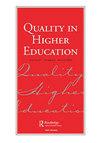高等教育教学质量管理的绩效指标:来自六所欧洲大学的标杆学习
IF 1.5
Q3 EDUCATION & EDUCATIONAL RESEARCH
引用次数: 4
摘要
本文介绍了Erasmus+项目的结果,该项目旨在为学习和教学提供综合绩效指标集。基于六所项目大学的基准学习练习,本文介绍了四个利益相关者群体(领导,质量管理人员,教师,学生)成员对开发指标集的评估的探索性研究结果。尽管一些学习和教学领域(能力和学习成果)似乎对提高学习和教学质量更为重要,但应该通过整体方法来评估学习和教学质量。受外部因素和综合内部做法的影响,不同利益相关者对项目绩效指标清单有用性的看法差别很大。此外,调查结果还表明,人们对如何评估学习和教学质量的认识并不充分。项目结果可能是一种诊断工具或一个战略机会,以补充现有的机构和国家学习和教学质量管理系统。本文章由计算机程序翻译,如有差异,请以英文原文为准。
Performance indicators in higher education quality management of learning and teaching: lessons from a benchlearning exercise of six European universities
ABSTRACT The article presents results of an Erasmus+ project that aimed at suggesting a comprehensive performance indicator set for learning and teaching. Based on a benchlearning exercise among the six project universities, the article presents findings of an exploratory research on the assessment of the developed indicator set by members of four stakeholder groups (leadership, quality management staff, teachers, students). It emerges that learning and teaching quality should be assessed through a holistic approach, though some learning and teaching domains (competences and learning outcomes) appear more important for learning and teaching quality enhancement. Perception on the usefulness of the project’s performance indicator list varies considerably among different stakeholders, influenced by both external factors and consolidated internal practices. Moreover, findings highlight a modest awareness of how learning and teaching quality is assessed. The project results may be a diagnostic instrument or a strategic opportunity to complement existing institutional and national quality management systems in learning and teaching.
求助全文
通过发布文献求助,成功后即可免费获取论文全文。
去求助
来源期刊

Quality in Higher Education
EDUCATION & EDUCATIONAL RESEARCH-
CiteScore
3.30
自引率
14.30%
发文量
32
期刊介绍:
Quality in Higher Education is aimed at those interested in the theory, practice and policies relating to the control, management and improvement of quality in higher education. The journal is receptive to critical, phenomenological as well as positivistic studies. The journal would like to publish more studies that use hermeneutic, semiotic, ethnographic or dialectical research as well as the more traditional studies based on quantitative surveys and in-depth interviews and focus groups. Papers that have empirical research content are particularly welcome. The editor especially wishes to encourage papers on: reported research results, especially where these assess the impact of quality assurance systems, procedures and methodologies; theoretical analyses of quality and quality initiatives in higher education; comparative evaluation and international aspects of practice and policy with a view to identifying transportable methods, systems and good practice; quality assurance and standards monitoring of transnational higher education; the nature and impact and student feedback; improvements in learning and teaching that impact on quality and standards; links between quality assurance and employability; evaluations of the impact of quality procedures at national level, backed up by research evidence.
 求助内容:
求助内容: 应助结果提醒方式:
应助结果提醒方式:


